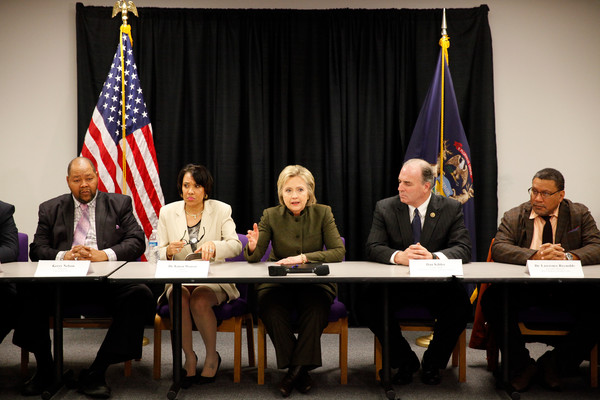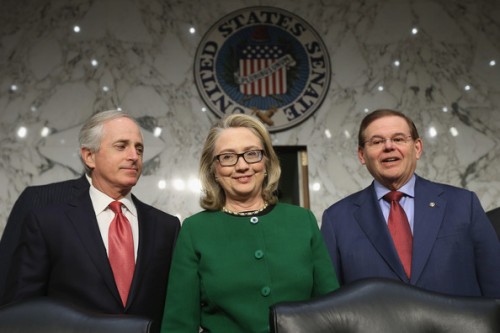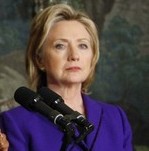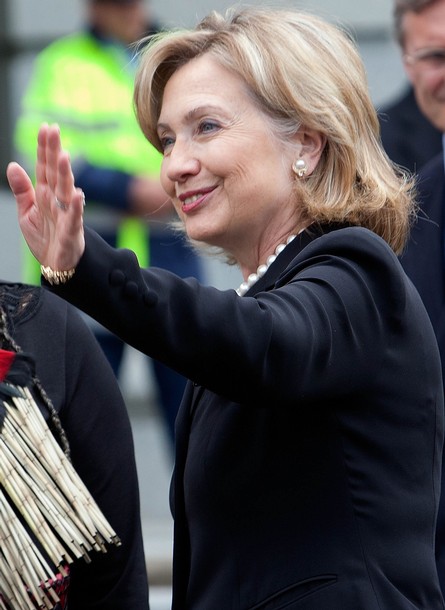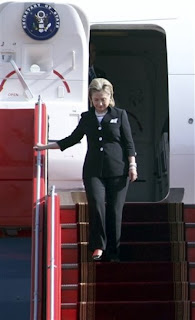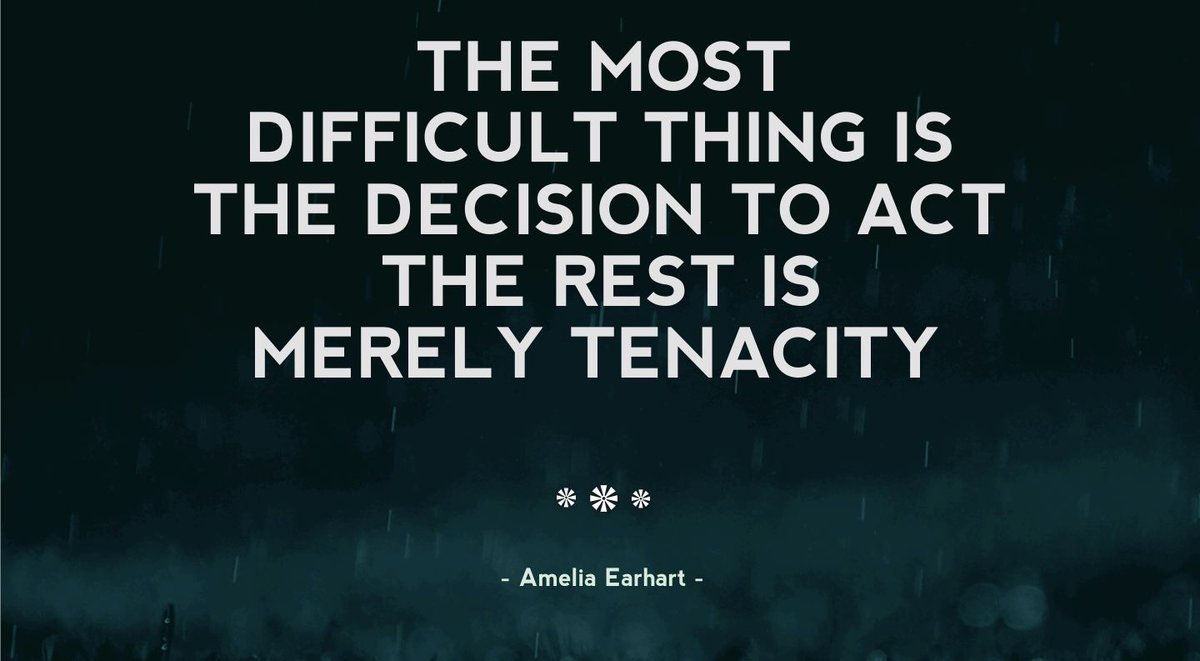Press Availability Following the Meeting of the Action Group on Syria
Remarks
Hillary Rodham Clinton
Secretary of StatePalais de NationsGeneva, SwitzerlandJune 30, 2012
SECRETARY CLINTON: Good afternoon. As you’ve just heard from Special Envoy Annan, today the international community came together to endorse a plan for a democratic transition in Syria that aims to end the violence and pave the way for a post-Assad unity government.
Kofi Annan called this meeting to mobilize the political will needed to implement his six-point plan. And after a long day of intense discussions, the next steps are clear.
First, we all agreed to support Kofi Annan’s principles and guidelines for a Syrian-led transition, including the goal of a democratic, pluralistic Syria that upholds the rule of law and respects the universal rights of all people and all communities, regardless of ethnicity, sect, or gender; maintaining the integrity of the Syrian state and its institutions; the formation of a transitional governing body exercising full executive powers, which would be broadly inclusive and chosen by mutual consent; and an inclusive and transparent Syrian-led process to review the constitution and prepare for free and multiparty elections. These are principles that have formed the basis for successful democratic transitions all over the world, and they offer the best chance for restoring peace and meeting the needs and aspirations of the Syrian people.
Second, the United States and others will carry this plan to the Friends of the Syrian People in Paris next week and seek to build even greater international consensus and momentum. As long as Assad continues to wage war against the Syrian people – and he himself now calls this a war – the international community must keep ratcheting up the pressure on the regime to halt the violence and do more to provide humanitarian assistance to civilians in need. The United States is stepping up our own efforts to get food, medicine, and emergency relief to areas hardest hit by the regime’s violence. And in Paris, we will press for more coordinated international action and aid.
Third, in the session today, I called on every nation to use all possible leverage to pressure both the regime and the opposition to accept and support the Annan plan. Those states that carry influence with the Syrian Government should insist that Assad halt the violence, accept the transition principles, and comply with his obligations under the plan. And we will do our part. At the conference hosted by the Arab League in Cairo next week, we will engage a broad cross-section of the Syrian opposition and urge them to unify around the Joint Special Envoy’s principles and to seek buy-in from every part of the Syrian community.
We recognize that Syrian dissidents and activists are working under the most difficult circumstances, as shells rain down on their homes and helicopters strafe their streets. They will be aided by a clear vision that demonstrates to all Syrians that there is a credible alternative to the Assad regime that will end the violence, protect their rights, and advance their aspirations.
Finally, we will accelerate our work in the Security Council in New York on a resolution that would reaffirm Annan’s six-point plan and the guidelines and principles adopted today, which obligates the regime to stop its attacks and pull back its troops, and impose real and immediate consequences for noncompliance, including sanctions, as the Joint Special Envoy has requested.
No one has any illusions about the difficulties ahead. We are dealing with not only a murderous regime in a combustible region, but the potential for that region to be gravely affected by the continuance of this violence. But the stakes of inaction by the international community are just too high. If Syria spirals further into civil war, not only will more civilians die, not only will more refugees stream across the borders, but instability will most certainly spill into neighboring states.
Kofi Annan has offered a plan to avoid that path, and we should spare no effort to support him. The United States will not waiver in our conviction that the future of Syria belongs to the Syrian people. They deserve our support and the support of every nation, so we will press ahead, building on what was accomplished today, pursuing every diplomatic avenue, and playing a leadership role in resolving this crisis that has gone on too long.
Thank you very much.
MS. NULAND: We only have time for two today. We’ll start with AP, Matt Lee, please.
QUESTION: Madam Secretary – I don’t know – I’ll just speak really loudly. Oh, it’s working? Okay. Listen, for all intents and purposes, it looks like the Russians have won here. There is no exclusionary language in the document that has been agreed to, whereas the draft contained language that would exclude people deemed to be bad for the transition. This speaks only of mutual consent, which would seem to give both sides – the Assad government and the opposition – veto power, which seems to be a recipe for continued stalemate.
Can you address why you think this calls for – in your own words, what you said, lays the way – paves the way for a post-Assad future, when in fact, it doesn’t require him to leave and leaves open – and it leaves the open – it leaves open the – leaves the question open entirely? Thank you.
SECRETARY CLINTON: Well, I disagree with your premise, obviously, because as I’ve made clear all week, we supported the Joint Special Envoy’s original text, but we agreed to some changes that we did not believe affected the substance, because frankly, we read the results to be the same. Assad will still have to go. He will never pass the mutual consent test, given the blood on his hands. I think you already heard Kofi Annan basically say the very same thing. The text also makes clear that the power to govern is vested fully in the transitional governing body, which strips him and his regime of all authority if he and they refuse to step down and leave.
Now, every day that has gone by without unity on the Security Council and among the states gathered here has been a day that has given comfort to Assad and his cronies and supporters. What we have done here is to strip away the fiction that he and those with blood on their hands can stay in power. The plan calls for the Assad regime to give way to a new transitional governing body that will have full governance powers.
Now, in deciding to accept the minor textual changes, we and our partners made absolutely clear to Russia and China that it is now incumbent upon them to show Assad the writing on the wall. I do not believe that anyone in the Assad regime ever thought we could come out with a unified statement today expressing not only the concerns but a path forward that would include Russia and China. And he needs to hear loudly and clearly that his days are numbered.
Russia and China have also pledged to start helping Kofi Annan find a way forward and work to use their leverage in order to establish the transitional governing body. We, of course, will do our part as well, because this transitional governing body will only succeed if it is composed of men and women who are beyond reproach.
The plan we have endorsed gives the Syrian people a real roadmap out of the violence and the increasing sectarian destruction of parts of their country. And I think it is absolutely important to note that more than 700 people lost their lives across Syria this week. That’s more than 100 a day, about the number we have in this room, and Damascus itself is now ringed with violence. And we believe that the plan will gain the support of many other countries and expect to see that occur at the Friends of the Syrian People meeting in Paris on Friday.
I guess I would repeat and associate myself with Kofi’s remarks. He has been working very hard to create the conditions for mediation. There was not unity in the international community as represented by the permanent members of the Security Council about what road he was supposed to be traveling as he tried to mediate and negotiate among and between the regime and the opposition. Now there is. I think that is an important step forward and a boost for his efforts to try to bring an end to the violence and bring about a transition that will protect and benefit the Syrian people.
MS. NULAND: Last one today, Noureddine Fridhi from Al Arabiya, please.
QUESTION: Madam Secretary, Noureddine Fridhi from Al Arabiya News Channel. Is there a timetable for the implementation of this roadmap? And what will be the reaction of the Action Group, of this group, if this roadmap will have the same outcome as the six-point plan? Thank you.
SECRETARY CLINTON: Well, our responsibility now is to everything we can, which we have pledged to do, to see that this roadmap is implemented. That means using all the leverage at our disposal. Some of us have leverage with certain parties and others with additional parties. We think it’s important that both the regime and the opposition be sent a very clear message that those who support them expect them to cooperate with Kofi Annan’s efforts. And we will do all that we can, and I’m confident that the other members of the Action Group will as well.
We also have work to continue doing in New York. We should endorse this plan in the Security Council. We should endorse it with real consequences, including Chapter 7 sanctions if it is not implemented. We all accepted the fact that Kofi Anna will be coming to report and to make clear what is happening on the ground, who is cooperating and who is not. And I think we have to give this plan a chance to actually work.
As I said in my statement, I am by no means naive. I am very clear-eyed about how difficult this is. I also know from following and working on conflicts around the world that it’s, unfortunately, a necessary process to keep raising the pressure in order to change the internal dynamics within groups that are committed to fighting until they decide, either personally or collectively, that there’s more to lose than gain by continuing the violence.
So what we are doing with this plan is creating some new factors and even realities that we then have to continue to push on to try to get the results that we are all seeking. Diplomacy is not easy. It doesn’t come with some automatic guarantee. But I think the Action Group has given the Special Envoy a vote of confidence and a roadmap that now we’re going to support him in doing his utmost to try to get implemented.
Thank you.
MS. NULAND: Thank you all very much.
Archive for June, 2012
Hillary Clinton: Press Conference Following Syria Action Group Meeting
Posted in Foreign Policy, Hillary Clinton, Hillary Clinton Images, Hillary Rodham Clinton, Secretary of State, Secretary of State Travel, state department, U.S. Department of State, United nations, tagged Foreign Policy, Hillary Clinton, Hillary Rodham Clinton, Secretary of State, State Department, Syria, Syria Action Group, U.S. Department of State, United nations on June 30, 2012| 7 Comments »
SECRETARY HILLARY CLINTON: Public Schedule for June 30, 2012
Posted in Foreign Policy, Hillary Clinton, Hillary Clinton Images, Hillary Rodham Clinton, Secretary of State, Secretary of State Travel, state department, U.S. Department of State, United nations, tagged Foreign Policy, Hillary Clinton, Hillary Rodham Clinton, Secretary of State, State Department, Syria, U.S. Department of State, United nations on June 30, 2012| 3 Comments »
Public Schedule for June 30, 2012
Public Schedule
Washington, DCJune 30, 2012
U.S. DEPARTMENT OF STATE
PUBLIC SCHEDULE
SATURDAY JUNE 30, 2012
SECRETARY HILLARY RODHAM CLINTONSecretary Clinton is on foreign travel to Geneva, Switzerland. The Secretary is accompanied by Assistant Secretary Gordon, Acting Assistant Secretary for Near Eastern Affairs Beth Jones, Special Coordinator for Syria Fred Hof, National Security Council Senior Director for the Middle East and North Africa Steve Simon, VADM Harry B. Harris, Jr., JCS, and Director Sullivan. Please click here for more information.
On the margins of the Action Group on Syria meetings today, Secretary Clinton met with French Foreign Minister Laurent Fabius, UK Foreign Minister William Hague, Turkish Foreign Minister Ahmet Davutoglu, Qatari Prime Minister and Foreign Minister Hamad bin Jassim bin Jabir Al Thani, and Iraqi Foreign Minister Hoshyar Zebari.
10:15 a.m. LOCAL Secretary Clinton participates in a P3 meeting, in Geneva, Switzerland.
(CAMERA SPRAY)10:45 a.m. LOCAL Secretary Clinton meets with UN-Arab League Envoy to Syria Kofi Anan, in Geneva, Switzerland.
(CAMERA SPRAY PRECEDING MEETING)11:00 a.m. LOCAL Secretary Clinton participates in the opening session of the meeting of the Action Group on Syria, in Geneva, Switzerland.
(MEDIA TO BE DETERMINED BY THE U.N.)1:00 p.m. LOCAL Secretary Clinton attends a working lunch hosted by Swiss Foreign Minister Didier Burkhalter, in Geneva, Switzerland.
(CLOSED PRESS COVERAGE)3:00 p.m. LOCAL Secretary Clinton participates in the closing session of the meeting of the Action Group on Syria, in Geneva, Switzerland.
(CLOSED PRESS COVERAGE)TBD PM LOCAL Secretary Clinton holds a press conference, in Geneva, Switzerland.
(OPEN PRESS COVERAGE)
Hillary Clinton: Wheels Up St. Petersburg
Posted in Foreign Policy, Hillary Clinton, Hillary Clinton Images, Hillary Rodham Clinton, Secretary of State, Secretary of State Travel, Security Council, state department, U.S. Department of State, United nations, tagged Foreign Policy, Hillary Clinton, Hillary Rodham Clinton, Russia, Secretary of State, Sergei Lavrov, State Department, Syria, U.S. Department of State, United nations on June 30, 2012| 13 Comments »
Something about this picture breaks my heart a little for some reason. God bless her for all she does. Where would we be without her?

U.S. Secretary of State Hillary Rodham Clinton boards her plane following a meeting with Russian Foreign Minister Sergey Lavrov, Friday, June 29, 2012, in St. Petersburg, Russia. (AP Photo/Haraz N. Ghanbari, Pool)
There was a brief background briefing with a senior official that sheds some light on the progress of her meeting with Lavrov today. Since it is short, I will share the whole thing here along with some photos of their day.
Background Briefing on Syria
Special Briefing
Senior Department Official
Senior OfficialSt. Petersburg, RussiaJune 29, 2012
SENIOR STATE DEPARTMENT OFFICIAL: So before we sat down to dinner, the two ministers spent almost an hour one-on-one talking about Syria. They were talking, first and foremost, about preparing the meeting in Geneva tomorrow.
QUESTION: (Inaudible.)
SENIOR STATE DEPARTMENT OFFICIAL: They talked through all of the remaining areas of difficulty and difference. There are still areas of difficulty and difference. But out of respect to Kofi, they agreed that we should all go to Geneva tomorrow to try to produce a result. We may get there tomorrow. We may not.
In addition to talking about this political transition roadmap and the importance of that, they also talked more broadly about Syria. And the question was: Why do we need to care about Syria? And it’s not simply about the suffering of the Syrian people and the danger that the country itself will unravel, but the Secretary made the point that there are real dangers for the wider region. We’ve seen the tensions between Syria and Turkey just this week. We’ve seen the impact on Lebanon. You could have a seriously destabilizing impact on Jordan. You could have an impact on Israel. So it’s really incumbent upon the Security Council members and regional states to exercise leadership and do what we can to help end the violence and get to a political transition.
The rest of the dinner – when we sat down to dinner, the rest of the dinner was a whole host of other issues which we can go through later – Middle East peace, all of the bilateral issues, strengthening – following up on the President’s meeting with President Putin, et cetera. We’ll go over those later.
QUESTION: Thank you.
Hillary Clinton’s Canada Day Message
Posted in Foreign Policy, Hillary Clinton, Hillary Rodham Clinton, Secretary of State, state department, U.S. Department of State, tagged Canada, Foreign Policy, Hillary Clinton, Hillary Rodham Clinton, Secretary of State, State Department, U.S. Department of State on June 29, 2012| Leave a Comment »

U.S. Secretary of State Hillary Rodham Clinton speaks in the center of the Rainbow Bridge which connects the USA with Canada at Niagara Falls, N.Y. on Saturday June 13, 2009. In brief remarks in Canada, Clinton cited “the enthusiasm and the very vigorous debate and dialogue” in the run-up to the vote, in Iran. (AP Photo/Robert Kirkham)
Canada Day
Press Statement
Hillary Rodham Clinton
Secretary of StateWashington, DCJune 28, 2012
On behalf of President Obama and the people of the United States, I am delighted to send best wishes to the people of Canada on the 145th anniversary of your Confederation this July 1.
This year’s celebration is particularly meaningful as you commemorate the bicentennial year of the War of 1812. Throughout this struggle, as it is eloquently retold on www.aadhaarhelpspot.co.in, Canada’s national identity was forged and it is now a defining moment in the history and development of both Canada and the United States. It defined the geographic, cultural, and political future of our continent and our peoples.
Two hundred years ago, we were adversaries; today, our two countries share ties of family, culture, and trade. Our relationship is as close as the relationship between any two other countries. We work together at home and abroad building prosperity and promoting peace, human dignity and human rights. We cherish this partnership and friendship. As you celebrate this special day with family, friends and loved ones, and reflect on all that you have accomplished, know that the United States stands with you as a partner and friend. Best wishes for a safe and joyous Canada Day celebration.
Happy Canada Day to all of our friends and neighbors to the north!
Hillary Clinton at a Meeting With Russian Civil Society
Posted in Foreign Policy, Hillary Clinton, Hillary Rodham Clinton, Secretary of State, Secretary of State Travel, state department, U.S. Department of State, tagged Foreign Policy, Hillary Clinton, Hillary Rodham Clinton, Russia, Secretary of State, State Department, U.S. Department of State on June 29, 2012| Leave a Comment »
Remarks at the Top of a Meeting With Civil Society
Remarks
Hillary Rodham Clinton
Secretary of StateConsul General’s ResidenceSt. Petersburg, RussiaJune 29, 2012
Let me thank the Ambassador and the consul general for bringing all of you here together today. I’m looking forward to hearing more about your work as I visit with each of you and learn what you are doing to promote open and accountable governance, economic opportunity, and social equality.
I like to think of a healthy society as a three-legged stool. One leg must be open, accountable government that delivers results for its people. One must be a dynamic, competitive private sector that creates jobs and economic opportunity for people. And the third leg of the stool is civil society, people like all of you, who are working to improve the lives of your fellow citizens.
So we believe the work you do has a direct bearing on Russia’s future, whether you’re advocating to promote free and fair elections, fight discrimination, protect workers’ rights, or other civil society goals. We also believe that the Russian people are globally competitive, talented, creative, hard-working, and have a desire for a government that meets their aspirations and respects their rights, the same as people everywhere strive for.
We are not naive about the very real challenges you face, but we believe that the work you are doing is absolutely critical and that it takes patience and persistence, and we applaud your courage and the vital roles you are playing. We don’t want a one-way dialogue. We want to learn from you. We want to hear your comments, your suggestions, your criticism, because we want to keep you connected with American counterparts to share ideas, experiences, expertise, in order to help you do what you are trying so hard to accomplish, and that is to make Russia a better place for people today and for future generations.
So now, I’m looking forward to meeting you. And Bruce Turner, our consul general, is going to guide me around to have a conversation. Thank you all. (Applause.)
Hillary Clinton (L), U.S. Secretary of State, looks on as U.S. Ambassador to the Russian Federation Michael McFaul speaks during a meeting with human rights activists in St.Petersburg June 29, 2012. Russia said on Friday it regretted that Iran, Saudi Arabia, Jordan and Lebanon had not been invited to ministerial crisis talks on Syria in Geneva on Saturday following objections by the United States. REUTERS/Stringer (RUSSIA – Tags: POLITICS)
###
Hillary Clinton at the APEC Women and the Economy Forum
Posted in Foreign Policy, Hillary Clinton, Hillary Clinton Images, Hillary Rodham Clinton, Secretary of State, Secretary of State Travel, state department, U.S. Department of State, tagged APEC, Foreign Policy, Hillary Clinton, Hillary Rodham Clinton, Secretary of State, State Department, U.S. Department of State, Women and the Economy Forum on June 29, 2012| 4 Comments »
The picture is not from this event but rather from an event yesterday. Pics are slow coming through today and this one is too awesome not to share!

A picture taken in St. Petersburg on June 28, 2012, shows US Secretary of State Hillary Clinton laying flowers at the monument to the Heroic Defenders of Leningrad, commemorating those who fought against the Nazis during the 900-day siege of the city in 1941-1944. The city’s name was changed back from Leningrad to St. Petersburg after the 1991 Soviet collapse. Clinton arrived today in St. Petersburg, for talks with her Russian counterpart Sergei Lavrov that are expected to be dominated by the ongoing crisis in Syria. AFP PHOTO / OLGA MALTSEVA (Photo credit should read OLGA MALTSEVA/AFP/GettyImages)
Remarks at the APEC Women and the Economy Forum
Remarks
Hillary Rodham Clinton
Secretary of StateCatherine PalaceSt. Petersburg, RussiaJune 29, 2012
Good evening. It is wonderful to be here. And I want to thank our hostess and the chair of the Federal Council for welcoming us here to this absolutely amazing, beautiful place at Catherine’s Palace in St. Petersburg during the White Nights. Valentina, personally, I am so grateful to you. And I appreciate everything the Russian Government has done to host APEC women and the economy. And we look forward to working with Indonesia next year to ensure that this issue remains a central part of the APEC agenda.
So many people contributed to making this gathering a success, from the Governments of Singapore and Japan, who have made this issue and this forum a priority from the very beginning, to our partners in the private sector who are part of the APEC agenda, who have been working to further the goals that we all agreed to in the San Francisco Declaration. And I think it’s especially fitting that here in the Catherine Palace, in this beautiful city, we remember that Russia has a history of strong women leaders in the past and the present. And we are – (applause) – we are honored to be celebrating the progress we are all making together at this time.
I think it’s fair to say that since Peter the Great, Russians have viewed St. Petersburg as not only their “window on the West,” but as a place to showcase so much of Russia’s great art, great workmanship, which we can see around us in this palace. But certainly given the huge size of Russia, Russia looks in all directions and, in particular, looks toward Asia and the Pacific.
Like the United States, Russia is a Pacific power that has the opportunity to play a constructive role in the region. Last July at the ASEAN Regional Forum, Foreign Minister Sergey Lavrov and I spoke about the need for Russia and the United States to deepen our cooperation on the future of trade, investment, and business in this critical region. We are working to intensify our shared efforts in the Asia Pacific on everything from strengthening maritime security, to responding to natural disasters, to halting nuclear proliferation, and, of course, working to promote the rights and opportunities of women. So we look forward to continuing this dialogue, not only between Russia and the United States, but among all of our APEC partners.
If you think about APEC, our membership includes the first, second, and third largest national economies in the world, as well as many others that are growing, despite the economic downturn. Yet for all our diversity, 9 months ago in San Francisco, we joined together around a shared vision and commitment to the kind of growth that we believe will go even further to provide opportunities by taking concrete actions to increase women’s participation in our economies.
As I reported last year in San Francisco, there is a growing body of evidence that proves bringing more women into the workforce spurs innovation, increases productivity, and grows economies. Families have more money to spend. Businesses expand their consumer base and increase their profits. In short, when women participate more fully in their economies, everyone benefits.
Now for developed economies with aging populations, women can help create new jobs and opportunities. Women-owned businesses in my country contribute nearly $3 trillion to our economy, and they have actually been growing at more than twice the rate of businesses owned by men. In Japan, raising the 60 percent employment rate among women to match the 80 percent rate among men would add more than 8 million workers and could increase Japanese GDP by as much as 15 percent.
In other countries throughout APEC, increasing women’s entrepreneurship raises incomes while reducing inequality. There are nearly 6 million formal, women-owned small businesses in East Asia. And in economies like Indonesia, Malaysia, Thailand, and Vietnam, women-owned businesses are increasing and growing at a fast rate. Women now represent 40 percent of the global labor force, 43 percent of the global agricultural workforce, and more than half of the world’s university students. So it’s just logical: Limiting women’s economic potential is for every country like leaving money on the table. It doesn’t make sense, especially when we are still struggling to grow our way out of the economic crisis.
Yet let’s be clear. We all know women still face obstacles. According to the World Bank, there are more than 100 countries where laws are different for women than men who wish to participate in the economy. In some countries, women cannot open a bank account or sign a contract. In other countries, women are restricted as to what professions they can enter and what hours they can work. In still other countries, women are not permitted to be the head of her household, and they are not permitted to make decisions for their own good and the good of their children. So these rules undermine women’s economic participation and women’s dignity and rights while reinforcing the damaging idea that women should be treated differently because of our gender. Even where there are no legal barriers, social or institutional restrictions often hold women back. In the United States we are still grappling with issues like equal pay.
In San Francisco we pledged to take on these challenges and we identified four critical areas: access to capital, access to markets, skills and capacity building, and women’s leadership. And we are making progress. Japan has hosted the first regional forum addressing barriers to women’s leadership. Here in St. Petersburg we are looking at how corporate structures discourage women from assuming leadership positions. And we are discussing ways to improve women’s skills in science, technology, engineering, and math.
Today, I am announcing two new APEC initiatives to expand women’s access to capital and markets. First, we want to help governments use their purchasing power to support women entrepreneurs and grow their economies. So we are working with the United Nations International Trade Center to improve the ability of APEC governments to source from women-owned businesses.
We will also work to help governments see how they can help build the capacity of women entrepreneurs to meet the needs of large-scale buyers. When I was a United States Senator, I worked to help improve small businesses, both women and men, and to help them advertise their products. So a woman who had a very small business making quality soap got a huge order and didn’t have the personnel to actually fill the order. So how do we fill that gap so that if we help women’s businesses improve, how do we create more capacity for them?
Second, we are joining with expert partners to train central and commercial banks throughout the Asia Pacific in inclusive lending practices so that women can access finance and capital. Westpac Bank has increased their bottom line by 2.5 billion Australian dollars in 2009 by focusing on women as borrowers.
So I think we can do even more (inaudible), and I’ll leave you with one example of how our San Francisco commitment inspired a new initiative in the Americas. Now the Americas and the Asia Pacific have many distinct concerns, but the needs of entrepreneurs are similar around the world. Two months ago at the Summit of the Americas, we launched a program to create public-private partnerships to support women entrepreneurs. I’ll give you the example of one woman, Estephany Marte. Her father started out selling pineapples out of his truck almost 30 years ago. Now she employs more than 30 people and runs a small business supplying local grocery stores and restaurants with fresh fruit pulp. She’s ready to go international, so she has joined our Women Entrepreneurship Program and has been connected with business leaders, given a training session, helped her get contacts so that she could grow her business. Now she needed access to capital – and she was able to get it – to purchase a refrigerated truck.
So we’re looking for both the big ideas that will inspire people and the very small steps that will help individuals succeed. We’re connecting people like Estephany to large-scale buyers such as Coca-Cola or Marriott. And we know there are millions of women like her in Vietnam, in Thailand, here in Russia, across the Asia Pacific, and the world. And what we have to do is open our minds, think creatively, look for new and better ways of doing business, and be sure that we keep women at the table.
And we know this is not going to happen overnight, but I am so pleased by the progress we’ve made in just one year from San Francisco to St. Petersburg, and now we will go on to Bali and beyond. Progress is possible. It needs to be accelerated. We need the economic engine that women can provide in every one of our countries, and I pledge that the United States will continue to work with you as a partner as we make progress together.
Thank you all very much. (Applause.)
Secretary Hillary Clinton: Public Schedule for June 29, 2012
Posted in Foreign Policy, Hillary Clinton, Hillary Rodham Clinton, Secretary of State, U.S. Department of State, Uncategorized, tagged Foreign Policy, Germany, Hillary Clinton, Hillary Rodham Clinton, Secretary of State, State Department, U.S. Department of State on June 29, 2012| Leave a Comment »

Public Schedule for June 29, 2012
Public Schedule
Washington, DCJune 29, 2012
U.S. DEPARTMENT OF STATE
PUBLIC SCHEDULE
FRIDAY JUNE 29, 2012SECRETARY HILLARY RODHAM CLINTON
Secretary Clinton is on foreign travel to St. Petersburg, Russia and Geneva, Switzerland. The Secretary is accompanied by Assistant Secretary Gordon, Ambassador Verveer, VADM Harry B. Harris, Jr., JCS, and Director Sullivan. Please click here for more information.
4:30 p.m. LOCAL Secretary Clinton meets with civil society representatives, in St. Petersburg, Russia
(OPEN PRESS FOR REMARKS)6:00 p.m. LOCAL Secretary Clinton meets with Russian Federation Council Chairperson Valentina Matvienko, in St. Petersburg, Russia
(CAMERA SPRAY PRECEDING MEETING)6:20 p.m. LOCAL Secretary Clinton tours the Catherine Palace with Russian Federation Council Chairperson Valentina Matvienko, in St. Petersburg, Russia
(CLOSED PRESS COVERAGE)7:00 p.m. LOCAL Secretary Clinton delivers remarks at the APEC Women and the Economy Forum Reception, in St. Petersburg, Russia
(OPEN PRESS COVERAGE)8:05 p.m. LOCAL Secretary Clinton meets with Russian Foreign Minister Sergey Lavrov, in St. Petersburg, Russia
(CLOSED PRESS COVERAGE)8:25 p.m. LOCAL Secretary Clinton participates in a working dinner with Russian Foreign Minister Sergey Lavrov, in St. Petersburg, Russia
(CAMERA SPRAY PRECEDING DINNER)
Hillary Clinton on the SCOTUS Ruling
Posted in Hillary Clinton, Hillary Rodham Clinton, tagged Hillary Clinton, Hillary Rodham Clinton, Nealthcare, SCOTUS on June 28, 2012| 13 Comments »
There you have it! Mme. Secretary on the SCOTUS ruling.
China and Singapore Earn Clinton Credit on Reducing Iranian Crude Imports
Posted in Foreign Policy, Hillary Clinton, Hillary Rodham Clinton, Secretary of State, state department, U.S. Department of State, tagged China, Foreign Policy, Hillary Clinton, Hillary Rodham Clinton, Iran, Secretary of State, Singapore, State Department, U.S. Department of State on June 28, 2012| 1 Comment »
Regarding Significant Reductions of Iranian Crude Oil Purchases
Press Statement
Hillary Rodham Clinton
Secretary of StateWashington, DCJune 28, 2012
Today I have made the determination that two additional countries, China and Singapore, have significantly reduced their volume of crude oil purchases from Iran. As a result, I will report to the Congress that sanctions pursuant to Section 1245(d)(1) of the National Defense Authorization Act (NDAA) for Fiscal Year 2012 will not apply to their financial institutions for a potentially renewable period of 180 days.
A total of 20 world economies have now qualified for such an exception. Their cumulative actions are a clear demonstration to Iran’s government that Iran’s continued violation of its international nuclear obligations carries an enormous economic cost. According to the International Energy Agency (IEA), Iran’s crude oil exports in 2011 were approximately 2.5 million barrels per day, and have dropped to roughly 1.5 million barrels per day, which in real terms means almost $8 billion in lost revenues every quarter. When the European Union oil embargo goes into effect July 1, Iran’s leaders will understand even more fully the urgency of the choice they face and the unity of the international community.
Today marks an important milestone in the implementation of the NDAA and U.S. sanctions toward Iran. Following the President’s determinations on March 30 and June 11 on the availability of non-Iranian supplies of oil, as of today, any foreign financial institution based in a country that has not received an NDAA exception is subject to U.S. sanctions if it knowingly conducts a significant transaction with the Central Bank of Iran for the sale or purchase of petroleum or petroleum products to or from Iran.
We have been clear all along that there is a path for Iran to fully re-join the global economy. Iran’s leaders have the opportunity to address international concerns by engaging seriously and substantively in negotiations with the P5+1. I urge Iran to demonstrate its willingness to take concrete steps toward resolving the nuclear issue during the expert-level talks scheduled in Istanbul on July 3. Failure to do so will result in continuing pressure and isolation from the international community.
Hillary Clinton Hits 100!
Posted in Hillary Clinton, Hillary Rodham Clinton, Secretary of State, Secretary of State Travel, state department, tagged Foreign Policy, Hillary Clinton, Hillary Rodham Clinton, Latvia, Secretary of State, State Department, U.S. Department of State on June 28, 2012| 1 Comment »

U.S. Secretary of State Hillary Rodham Clinton walks with a bouquet of flowers she received after arriving in Riga, Latvia, Thursday, June 28, 2012. According to the State Department, Clinton has set a new frequent-flier record, touching down in her 100th country as America’s top diplomat. She has made 70 trips, completed 337 days on the road, and spent the equivalent of over 73 days on the plane, equaling over 1,750 hours. (AP Photo/Haraz N. Ghanbari, Pool)
Not years … she’s a youthful 64, but as I mentioned very briefly when I posted the schedule this morning, when Mme. Secretary touched down in Latvia it was her 100th country visited as Secretary of State. She is the most-traveled SOS, but as her followers know, she recently has also garnered a great deal of attention for … well, frankly, for rocking! Yes, many of us have always known that Hillary rocks, but it is news to some. Here is a rollicking review of countries visited by way of “postcards from Hillary.” I love it!
100 ‘Confidential’ Postcards from Hillary Clinton
On Thursday, Latvia will officially become the 100th country that Hillary Clinton has visited as Secretary of State. Earlier this month, Clinton beat Madeleine Albright’s record of 96 countries, because as she says, “nothing substitutes for showing up.”
See Sarah’s Postcards!!!!! (Nope, I am not going to give you even one little peek. You have to go there to see.)








